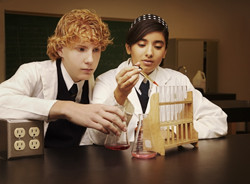Linking early science and mathematics with creativity
To build on the link between early science and mathematics education and children's creative potential, a major shift is needed in educational practices and cultures. Introducing new modes of classroom interactions can help stimulate self-expression and boost capacity for creativity and innovation later on. However, such a shift needs to be supported with appropriate teacher training and professional development. The CREATIVELITTLESCIENT(opens in new window) project brought together a consortium with diverse expertise to study the relevant aspects and advance the means for facilitating this shift. Research was carried out in Belgium, Germany, Greece, Finland, France, Malta, Portugal, Romania and the United Kingdom. Having documented the current reality in these nine countries, the team developed and refined a conceptual framework, and identified synergies between inquiry-based science education and creative approaches. These were empirically tested in various classroom contexts and found to be appropriate and valid for geographic and age contexts (3-8 years). Research findings underline the potential for inquiry and creativity through the opportunities teachers offer for generating and evaluating ideas and strategies. This holds for both preschool and primary school settings. A significant project outcome is a set of curriculum design principles that consortium members developed for teacher education. Key policy recommendations have also been made on the aims of targeted curriculums, teaching, learning and assessment, and contextual factors. The last point concerns sufficient resources and facilities, ongoing professional development, and dialogue with parents and other stakeholders regarding science and mathematics in early childhood. CREATIVELITTLESCIENT has published numerous reports and consortium members continue to present project findings at international conferences and related events. Partners are also mobilising their organisations and professional networks to exploit project results for enhanced early school creativity and innovation in science and mathematics education. The outcomes promise improved scientific literacy for a more knowledgeable and sustainable Europe, where informed citizens can contribute to decisions of societal importance.



